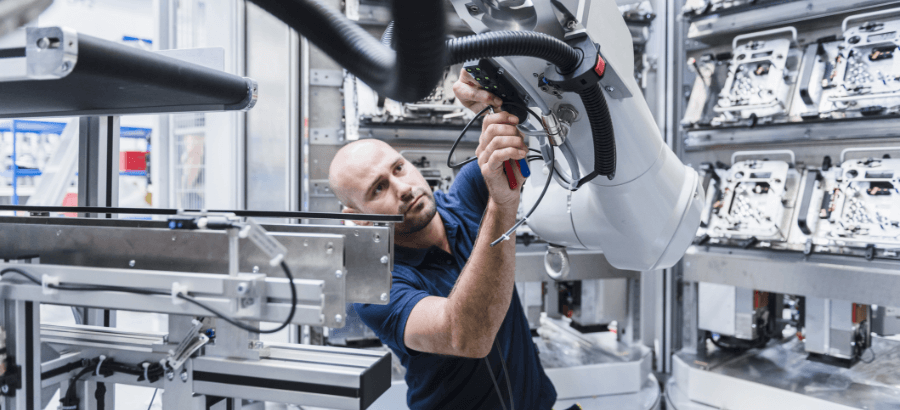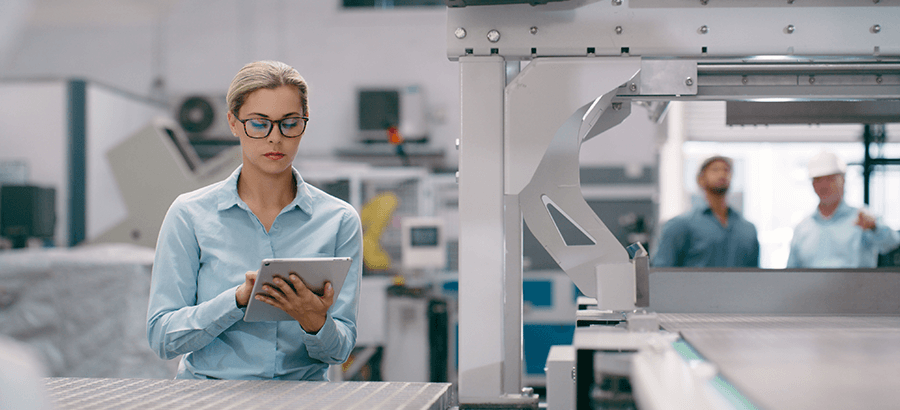As manufacturers and distributors inject their operations with innovative technologies in an effort to transform them into smart factories, a shift in how those factories are staffed has emerged. As industries evolve the distance between the worker and the job has grown, for example back in the day the worker had one tool between them and the task. As work becomes automated, jobs are proliferating – ones that require employees to work alongside machines, analyze and interpret data, solve problems as they arise and communicate with a diverse range of organizational stakeholders.
Let’s take a look at these new hybrid skills needed that combine technology and data expertise, and what this means for manufacturers and distributors as they transition into smart factories:
Skillsets that drive innovation in the smart factory
The Fourth Industrial Revolution focuses on innovations that harness the potential of emerging technologies such as AI, IoT, and robotics just to name a few. These technologies hold the key to exponential growth in efficiency and productivity. The rise of digitalization in the workplace has brought with it an interesting corollary for skills needed in human workers. Manufacturers and distributors will now need a complementary set of digital and operational skills on the shop floor and analytic skills to capture and derive actionable insights from vast amounts of data, and cybersecurity skills to safeguard against the risks that come with increased network connectivity. Technology has also resulted in the rise of the augmentation of human ability. For example, chatbots are now able to enhance human abilities, using AI to serve as an advisor or support to help maintain efficiencies within the organization.
As technology replaces many of the manual or repetitive tasks many jobs entail, it frees up space for skills that are uniquely human, often called ‘soft’ skills. A World Economic Forum study found that the top 10 skills for the next decade include essential human skills such as critical thinking, creativity, and people management. Companies need workers that can exhibit these skills as well as the digital skills necessary to work alongside automation.
Reskilling and attracting a smart factory workforce
Manufacturers and distributors face a transition – they need to recruit, train, or retrain workers with the up-to-date skills needed on modern factory floors. With the skills gap plaguing manufacturing in a tight labor market, companies should invest heavily in upskilling their current workforce as they digitally transform to ensure a pipeline of talent. By investing in training or recruiting employees with potential and a good learning ability employees can work towards transitioning their skills into the jobs that need to be filled.
Manufacturers and distributors now require a workforce proficient in data science, automation, and other digital skills and adept at soft skills like collaboration, problem solving, and customer engagement. While this shift will cause many current jobs to change, it will also create numerous new job opportunities. As factories add smarter tech, they’ll need people to manage it.
Using the latest technology is key to bridging the skills gap and attracting new talent into manufacturing and distribution industries. Government, businesses, and academic institutions should collaborate to ensure workers of both the present and future are equipped with the digital skills they will need to navigate the smart factory. People are not always aware about the extent of the employment opportunities that are available to them in the manufacturing and distribution sector. There is a huge gap as well between the global pace of education and the specialized roles that are rising. To bridge this gap and encourage an influx of new talent, it’s important that there are measures in place to inspire and incentivize young people to join the sector. This can be achieved through a variety of channels. For example, better informed career advice in schools to ensure students are made fully aware of their choices at key transitional stages, more effective and targeted outreach from employers to make clear the exact nature of the openings available and university courses made more universal and affordable.
While training tools such as augmented reality promise to make it easier to teach and learn new skills, perhaps the most important way manufacturers and distributors can digitally upscale the skills and competencies on their smart factory floors is to establish a culture of continuous improvement. The job role of the future will require extensive knowledge and in order to future-proof their organizations and maintain a competitive edge, manufacturers and distributors should eagerly adopt new technology and collaborative habits that will ensure their staff evolve right along with them.






